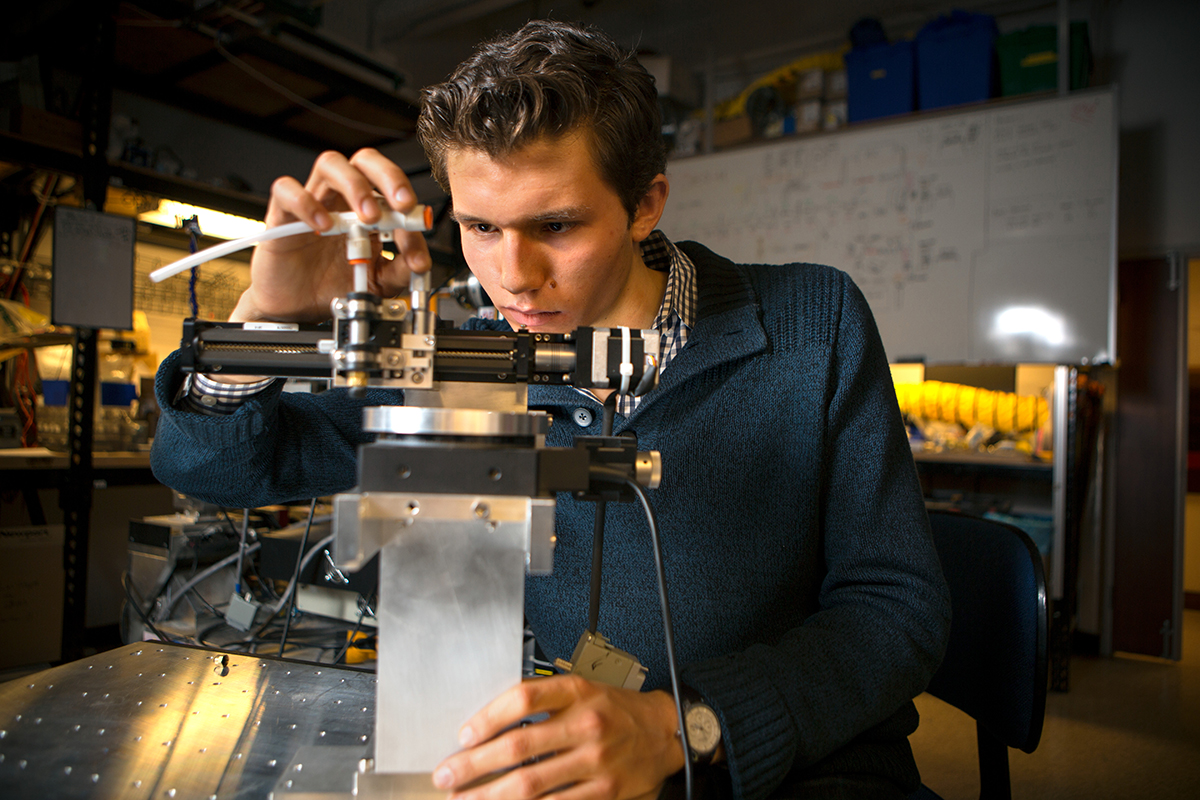Ambitious first-year students catch the research bug
By Spencer DeRoos Yvette Ndlovu and Kathy Hovis

As a precocious high school junior, Arthur Campello ’20 wanted to get some experience with his 3-D modeling and coding skills outside the classroom.
Graduating a year early from Lansing High School, just outside of Ithaca, Campello contacted Cornell physics professor Jim Alexander, who connected him to staff at the Cornell High Energy Synchrotron Source (CHESS). They gave him a tour, and Campello signed on for a monthlong internship there while still in high school.
“I was in awe, thinking that people are playing soccer and they have no idea there’s antimatter right under them, traveling at nearly the speed of light,” Campello said of his early days at CHESS. “I was given a desk and this new, very early stage project to work on for one month. But I just overstayed. I kept coming in.”
Campello is one of many Cornell students who latch on to research opportunities early in their college careers or even before college. Exposing undergraduates to research in the sciences, social sciences, the arts and humanities has long been a hallmark of the university, and many faculty members open their doors to students who show interest.
Carl Franck, associate professor of physics, is one of those faculty members. He was using and planning for improvements in the early stage project Campello was working on: an inelastic X-ray spectrometer developed by Kenneth Finkelstein, staff scientist at CHESS.
“In my research, I’m trying to float these ridiculously thin films off of substrates, so I am always very proud to get one that kind of works,” Franck said. “I’d been consulting with all kinds of experts all over the place to try to find a way to do this better, but then Arthur comes up with this new invention that is just remarkable.”
After being accepted to Cornell in the College of Arts and Sciences, Campello joined both of Franck’s research groups and also Alexander’s group, which is working on a collaborative project between Cornell, CERN (the European Organization for Nuclear Research) and other universities.
At one group meeting, Campello noticed he was the only freshman among mostly postdocs. “I’ve learned not to say I’m a freshman,” he said with a smile. “It discredits me a bit. But if someone asks, obviously, I’m not going to lie.”
There are risks when faculty involve students in research as freshmen or sophomores, Franck said. They might neglect their studies if they find research so compelling or fail to explore all of their research options if they get pigeonholed into one lab or group. But faculty keep a close eye to make sure their students are balancing their priorities.
“The most important thing around here is Arthur,” Franck said. “I sometimes wonder who will get this brilliant young man: Will he be trying to solve humanity’s problems or making wonderful discoveries in science?”
For Soumeeka Koneru ’20 and Megan Waller ’20, their research time is spent in the lab of Michael Goldstein, associate professor of psychology and director of the Behavioral Analysis of Beginning Years (B.A.B.Y.) Lab.
Koneru and Waller both study social learning and communicative development in human infants, as well as vocal learning in songbirds. Koneru began her work by learning how to code videos of human infants and by calling potential participants to gauge their interest in being part of the lab’s work.
“I really like the dynamic of the lab,” said Koneru, who plans to major in psychology. “I’ve always been interested in human development, developmental psychology and cognitive science, and so the lab is a mixture of all of my interests.”
For Waller, who was looking to be more involved on campus, her psychology classes were some of her most enjoyable, so she pursued research in that field. Mapping out the behavioral patterns of birds by watching bird videos and coding these behaviors are some of the memorable experiences she has had in the lab.
“It’s really involved,” Waller said. “We have lab meetings every week where we discuss research papers, and so this lab has been a great introduction to the discipline of psychology and to academia.”
Yibo Sun ’19, who studies economic growth in China, began work as a research assistant for the Cornell Institute for Chinese Economic Research (CICER) in the summer after her freshman year. The position allowed her to explore her interest in economic modeling.
A double major in computer science and economics, Sun consulted her adviser, Panle Jia Barwick, associate professor and co-director of CICER, about pursuing research opportunities with her.
“I looked for research opportunities in my freshman year because I like reading and thinking about economics,” Sun said. “I wanted to know how to study a specific topic in depth and what it is like to do economics research.”
Born and raised in China, Sun is gathering data on the dining industry in China from 2011 to 2016, and she hopes to aid in analyzing how competition and regulation affect performance and market structure in that sector.
Sun said her research and coursework have confirmed her interest in applied economics, which she plans to continue studying in graduate school, and also prepared her for her college studies.
“I have a more concrete plan of math and economics courses to take and skills to develop for the rest of my undergraduate studies,” she said. “I feel very fortunate to be able to be involved in research so early.”
Spencer DeRoos ’19 and Yvette Ndlovu ’18 are communications assistants. Kathy Hovis is a writer for the College of Arts and Sciences.
Media Contact
Get Cornell news delivered right to your inbox.
Subscribe